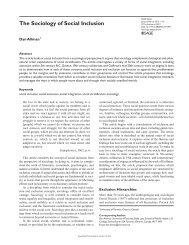Inclusive Education for Learners With Disabilities in ... - SAGE Open
Inclusive Education for Learners With Disabilities in ... - SAGE Open
Inclusive Education for Learners With Disabilities in ... - SAGE Open
Create successful ePaper yourself
Turn your PDF publications into a flip-book with our unique Google optimized e-Paper software.
Mukhopadhyay et al. 9Forl<strong>in</strong>, C. (2010). Teacher education <strong>for</strong> <strong>in</strong>clusion. In R. Rose (Ed.),Confront<strong>in</strong>g obstacles to <strong>in</strong>clusion: International responses todevelop<strong>in</strong>g <strong>in</strong>clusive education (pp. 155-169). London, England:Routledge.Fox, L., Hemmeter, M. L., Snyder, P., B<strong>in</strong>der, D. P., & Clarke, S. (2011).Coach<strong>in</strong>g early childhood special educators to implement a comprehensivemodel <strong>for</strong> promot<strong>in</strong>g young children’s social competence.Topics <strong>in</strong> Early Childhood Special <strong>Education</strong>, 31, 178-192.Gaotlhobogwe, B. (2001). <strong>Inclusive</strong> education: An <strong>in</strong>vestigation ofthe support system <strong>for</strong> pupils with special educational needs <strong>in</strong>Botswana (Unpublished master’s thesis). University of Manchester,England.Giorgi, A., & Giorgi, B. (2003). Phenomenology. In J. A. Smith(Ed.), Qualitative psychology: A practical guide to researchmethods. London, England: <strong>SAGE</strong>.Government of Botswana. (1977). National policy on education.Gaborone, Botswana: Government Pr<strong>in</strong>ters.Government of Botswana. (1993). National commission on education.Gaborone, Botswana: Government Pr<strong>in</strong>ters.Government of Botswana. (1994). Revised national policy on education.Gaborone, Botswana: Government Pr<strong>in</strong>ters.Johnstone, C. J. (2007). <strong>Inclusive</strong> education <strong>in</strong> Lesotho. In P. Engelbrecht& L. Green (Eds.), Respond<strong>in</strong>g to the challenges of <strong>in</strong>clusiveeducation <strong>in</strong> southern Africa (pp. 25-38.). Pretoria, SouthAfrica: Van Schaik.Johnstone, C. J., & Chapman, D. W. (2009). Contributions andconstra<strong>in</strong>ts to the implementation of <strong>in</strong>clusive education <strong>in</strong>Lesotho. International Journal of Disability, Development and<strong>Education</strong>, 56, 131-148.Kaikkonen, L. (2010). Promot<strong>in</strong>g teacher development <strong>for</strong> diversity.In R. Rose (Ed.), Confront<strong>in</strong>g obstacles to <strong>in</strong>clusion:International responses to develop<strong>in</strong>g <strong>in</strong>clusive education(pp. 155-169). London, England: Routledge.Kath, B. (2005). Snowball sampl<strong>in</strong>g: Us<strong>in</strong>g social networks toresearch non-heterosexual women. International Journal ofSocial Research Methodology, 8, 47-60.Mangope, B. (2002). The attitudes of rural primary and secondaryschool teachers toward the <strong>in</strong>clusion of students with disabilities<strong>in</strong> their classrooms <strong>in</strong> Botswana (Unpublished master’s thesis).University of Melbourne, Australia.Masimega, N. T. (1999). Includ<strong>in</strong>g students with hear<strong>in</strong>g impairment(Unpublished master’s thesis). Manchester, UK: University ofManchester.Mpofu, E. (2003). Enhanc<strong>in</strong>g social acceptance of early adolescentswith physical disabilities: Effects of role salience, peer <strong>in</strong>teraction,and academic support <strong>in</strong>terventions. Internal Journal ofDisability, Development and <strong>Education</strong>, 50, 435-454.Mpofu, E., Kasayira, J. M., Mhaka, M. H., Chiresh, R., &Maunganize, L. R. (2007). <strong>Inclusive</strong> education <strong>in</strong> Zimbabwe.In P. Engelbrecht & L. Green (Eds.), Respond<strong>in</strong>g to the challengesof <strong>in</strong>clusive education <strong>in</strong> Southern Africa. Pretoria,South Africa: Van Schaik.Mukhopadhyay, S. (2009). Factors <strong>in</strong>fluenc<strong>in</strong>g the practice of<strong>in</strong>clusive education <strong>in</strong> Botswana primary school (Unpublisheddoctoral dissertation). University of Botswana.Ocloo, M. A., & Subbey, M. (2008). Perception of basic teacherstowards <strong>in</strong>clusive education <strong>in</strong> the Hohoe District of Ghana.International Journal of <strong>Inclusive</strong> <strong>Education</strong>, 12, 639-650.Otlhogile, B. (1998). Educat<strong>in</strong>g the disabled <strong>in</strong> Botswana implications<strong>for</strong> the government: Key address. In C. O. Abosi, K. Didimalang& P. O. Nwaugo (Eds.), Issues and access and opportunity tobasic education <strong>for</strong> disabled children <strong>in</strong> Botswana. Gaborone:Botswana Council <strong>for</strong> the Disabled.S<strong>in</strong>gal, N. (2005). Mapp<strong>in</strong>g the field of <strong>in</strong>clusive education: Areview of Indian literature. International Journal of <strong>Inclusive</strong><strong>Education</strong>, 9, 331-350.S<strong>in</strong>gal, N. (2006). An eco-systemic approach <strong>for</strong> understand<strong>in</strong>g<strong>in</strong>clusive education: An Indian case study. European Journal ofPsychology of <strong>Education</strong>, Special issue: Ten Years After Salamanca,XXI, 239-252.Turnbull, A., Turnbull, H., Shank, M., & Lead, D. (1999).Exceptional lives: Special education <strong>in</strong> today’s schools(2nd ed.). Upper Saddle River, NJ: Prentice Hall.United Nations <strong>Education</strong>al, Scientific, and Cultural Organization.(1994). F<strong>in</strong>al report: World conference on special needs education:Access and equality. Paris, France: Author.Zimba, R. F., Mowes, A. D., & Naanda, A. N. (2007). <strong>Inclusive</strong>education <strong>in</strong> Namibia. In P. Engelbrecht & L. Green (Eds.),Respond<strong>in</strong>g to the challenges of <strong>in</strong>clusive education <strong>in</strong> SouthernAfrica (pp. 39-51). Pretoria, South Africa: Van Schaik.BiosSourav Mukhopadhyay, PhD, Senior Lecturer, <strong>Education</strong>alFoundations, University of Botswana. He is professionally qualifiedas Speech Pathologist and worked extensively with learnerswith communication disorders. He is equally <strong>in</strong>terested <strong>in</strong> the areaof <strong>in</strong>clusive education <strong>for</strong> learners with special educational needs.H. Johnson Nenty, PhD, Associate Professor, <strong>Education</strong>alFoundations at University of Botswana. He teaches courses <strong>in</strong> educationalresearch, measurement, statistics and evaluation. He hasalso published extensively <strong>in</strong> these areas.Okechukwu Abosi, PhD, is a Professor of Special Needs <strong>Education</strong>at the University of Brunei. His research <strong>in</strong>terests are <strong>in</strong> <strong>in</strong>clusiveeducation, diversity, street children and m<strong>in</strong>ority rights. Prof Abosihas published many books, research journal articles, and chapters<strong>in</strong> books <strong>in</strong> the area of special education and <strong>in</strong>clusive education.Downloaded from by guest on January 12, 2015















